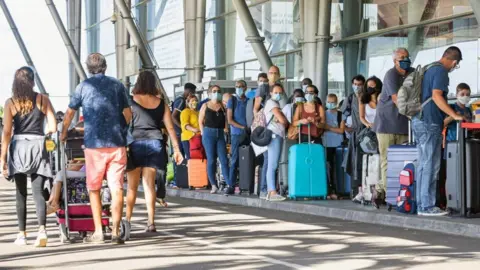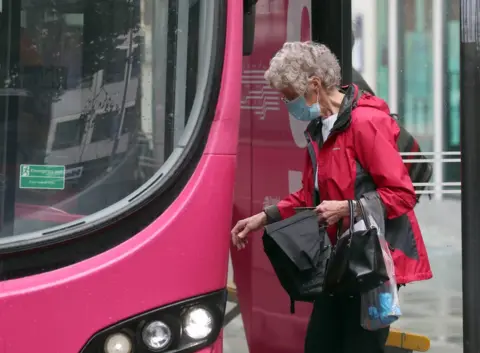Covid-19: Quarantine rules to be eased on 26 July for some NI travellers
 Getty Images
Getty ImagesFrom 26 July, fully vaccinated people returning to Northern Ireland from so-called amber countries will not have to quarantine under new indicative dates agreed by the executive for lifting Covid restrictions.
Stormont ministers agreed the changes when they met on Thursday.
They also agreed that theatres are to be allowed to reopen on 26 July.
The requirement for face coverings to be worn in places of worship could also be removed then.
However, most proposals will need to be ratified at an executive meeting on 22 July.
The plans agreed at Thursday's executive meeting mean that Northern Ireland will not directly follow the approach Prime Minister Boris Johnson has outlined for England.
He has said masks will no longer be required and social distancing rules will be scrapped for England at the final stage of his government's plan, due to take effect on 19 July.
 Pacemaker
PacemakerStormont ministers have agreed to make the following changes on 26 July, subject to health advice:
- the reopening of theatres and indoor seated venues for performances - with mitigations including entry only by tickets bought ahead of an event
- the return of conferences and exhibitions
- live music indoors with no restrictions on sound levels
- 10 people from three households to meet indoors in a private home
- 15 people from any number of households to meet in a private garden
- remove the "linked households/bubble" provision
- close contact services to operate without appointments
- reduce the legal requirement for social distancing to 1m indoors and remove it for all outdoor activities - instead keeping social distancing guidance to advise 1m if possible for all activities indoors and outdoors
- remove some restrictions in MoT centres to make it easier for examiners to carry out vehicle tests
It is understood ministers also agreed to consider removing the guidelines for students to wear face coverings in classrooms and school "bubbles" but that, along with other measures, would be subject to public health conditions on 22 July.
It is understood the executive has agreed to give consideration to the full return of live music and dancing without mitigations later in August.
The BBC understands ministers will at that stage, also look at lifting remaining restrictions on mandatory use of face coverings, as well as the removal of social distancing and isolating.
The government's Transport Secretary Grant Shapps has set out his plans for England.
From 19 July, fully vaccinated adults there will not need to isolate from amber list countries.
Allow X content?
It is believed all of the measures would still need to be rubber stamped closer to the time at an executive meeting on 22 July.
Theatres and some other audience venues have been closed or had to restrict numbers throughout the pandemic because of social-distancing guidance.
They had previously been given an indicative date of 21 June for their reopening but the executive has so far delayed that.
Jimmy Fay of the Lyric Theatre in Belfast said on Thursday that the vaccination programme had been "such a success that we need to look at a date, preferably in September, when we can remove all social distancing in theatres".
Some other indoor entertainment venues such as cinemas have been allowed to resume trading.
Speaking after the executive meeting, First Minister Paul Givan said ministers from his party - the Democratic Unionist Party (DUP) - believed more progress could be made "at a faster pace".
"We believe that is backed up by all of the data, the scientific evidence, the impact on our economy and the impact on family and wider society," said Mr Givan.
The minister said the executive had received a "very positive report" about a falling number of Covid-19-related deaths, but that other ministers decided they wanted to "move forward at a slower pace".
'Cautious but steady approach'
Deputy First Minister Michelle O'Neill said the executive had taken a "cautious" and "steady" approach, which she believed was the "right one".
She said "the Boris Johnson approach" to easing restrictions was reckless.
"Based on our own information and our own data we have taken decisions today that demonstrates progress, demonstrates that we're able to continue to make some easements," said Ms O'Neill.
Earlier Sir Michael McBride, Northern Ireland's chief medical officer, has expressed concern about mixed messages on issues such as masks.
"It's important that we guard against sending the public mixed messages about the evidence around matters such as face coverings and the benefit of face coverings," he said.
"Whether those are mandatory or whether those are voluntary, those are policy matters and ultimately a matter for ministers."
Infrastructure Minister Nichola Mallon met representatives from the Unite union ahead of the executive meeting.
Allow X content?

